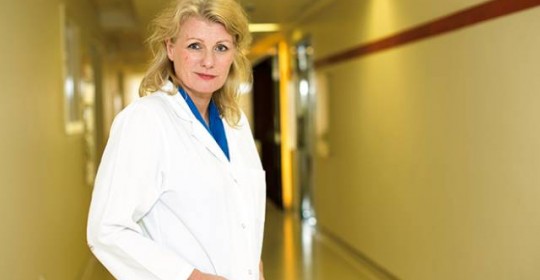
Dr. Jacobs, neurologist at Dubai’s GNC, on the importance of sleep – Friday Magazine
Doctor Heike Jacobs tells us about our brains
Heike Jacobs, a specialist in neurology at Dubai’s German Neuroscience Center, on brain apps and the importance of sleep. By Mike Peake, Friday Magazine, 1 May 2015
Just how powerful is the human brain? People sometimes say that it packs more punch than a supercomputer.
I’m sure it does. We have hundreds of billions of neurons constantly firing – the brain never sleeps even when we sleep. All areas of the brain are mostly working – it’s quite a myth to think that only a low percentage of the brain is ever used. Most of the time 100 per cent of it is doing something to keep us alive; to breathe, to get our heart going or even just to sit and think.

Do any of those brain-training apps work?
I know it’s a big business these days but the evidence of whether they work is conflicting. We do know that intelligence is pretty much stable from our teenage years on, but you can improve your attention and concentration with a few of those apps, in particular anything to do with memory and logical thinking. But you will certainly not be able to increase your intelligence
So our brain’s capacity for intelligence is decided at birth?
The common thinking is that one third is genetic, one third is your social upbringing and the other third is your free will – what you do to make the best of your potential.
What is a typical day for you?
I see maybe seven or eight new patients who come with various symptoms ranging from headaches to numbness to backache and memory problems. I also see follow-up patients to ensure their treatment continues to be as effective as possible. My task is to find out if there is an underlying neurological disease. It’s a bit like detective work – I talk to patients, ask lots of questions, test their reflexes, examine them and then do some sophisticated electro-physiological tests. I then form a diagnosis, and there’s a lot we can do for people with a neurological disease, particularly during the past 10 years as there have been huge advances in therapies.
Do you see people failing to take care of their brains on a daily basis?
Seeing people on bikes not wearing helmets is a major concern. It is very worrying because we know that if you fall from a bike you can easily fracture an artery on the skull that can lead to death within a couple of hours. Helmets are proven to make a big difference. I would also love people to drive a little more carefully here: the way people drive is quite competitive and as a result, very dangerous. Many people suffer serious head traumas in car crashes, and aggressive driving also increases stress, which can lead to sleep problems, anxieties and panic attacks.
Does the UAE have any particular issues with regard to neurology?
I see a lot of patients with headache syndromes, sleep difficulty and panic attack disorders. Another thing I have learned about the region is that there are many Parkinson’s disease patients, possibly undiagnosed and also in some cases very young, for genetic reasons. I would encourage patients with shaking arms and slowed down movements to see a neurologist for evaluation.
 How resilient is the brain?
How resilient is the brain?
It does have self-healing capacities, but it can be quite a slow process. Neurosurgeons do amazing things. After a car accident, for example, if you have a sudden brain bleed and it’s compressing the cerebrum, the surgeons are the ones who open the skull, take the blood out and as a result people survive, often recovering without any long-lasting problems. They can operate on tumours that are slowly growing and taking away speech, and when successful this can lead to a full recovery.
Is there anything we can do now to avoid dementia in later life?
Live a healthy lifestyle. Keep active socially with lots of social contact and keep as mentally on-your-toes as you can – things like learning to speak different languages can help.
Do you have any special tricks for dealing with a headache at home?
It depends – if it’s a migraine you want to close the curtains, drink lots of water and also be aware that sometimes certain smells can trigger it. If it’s a long-term tension headache we would advise cardiovascular training and meditation techniques.
Finally, one of your specialties is sleep disorders. What’s your top tip?
What works for me is going to the gym and working out. If you have any worries, write them in a book or a diary and promise yourself that you’ll deal with them the next morning. Try not to think about them before bed, and get into a relaxed state for at least two hours before you intend to turn the lights off.

